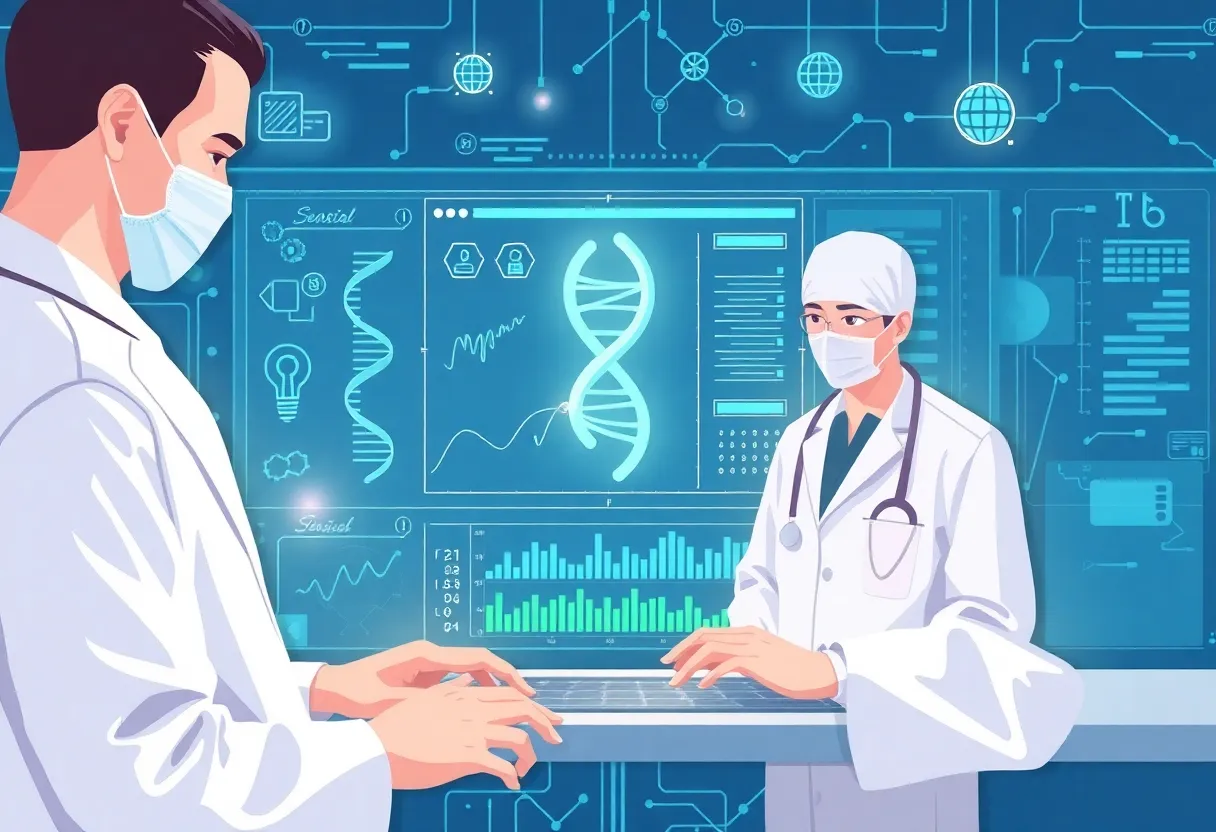Boston, October 20, 2025
News Summary
Bystro, a startup situated at MassChallenge in Boston Seaport, has developed an AI tool designed to interpret personal genetic data to provide tailored health insights. By utilizing advanced natural language processing, Bystro enables users to query their genetic data for personalized answers related to medication response, hormone levels, and other health concerns. This innovative approach has the potential to enhance precision medicine and bridge the gap between genetic research and practical health solutions.
Boston — A startup called Bystro is developing an AI tool that interprets personal genetic data to answer individualized health questions. The platform is being built at MassChallenge in Boston Seaport and aims to combine ancestry-style reports, search-engine convenience, and primary-care relevance to deliver tailored genetic insights for individuals, researchers and clinicians.
Key facts and immediate impact
Bystro is an AI genomics research assistant being developed at MassChallenge in Boston Seaport. The system accepts user queries about medication response, hormone levels, and other health issues and returns answers that are personalized to the user’s genetic data rather than generic health guidance. The startup combines features of Ancestry.com, traditional search engines, and primary health care for comprehensive insights.
Bystro can analyze DNA from individuals or large datasets, potentially revolutionizing precision medicine. The technology uses advanced natural language processing to translate complex genetic results into understandable information tied to specific questions. The company intends for the platform to become available to researchers, doctors, and individual users.
Market context and timing
The AI landscape in healthcare is expanding rapidly with a global market anticipated to grow from $26.6 billion in 2024 to $187.7 billion by 2030, reflecting a 38% growth. That projected expansion frames investor and developer interest in tools that combine genomics with large language models and clinical research workflows.
Team, origins and collaborations
The project was founded by a team with academic and personal motivation in genetics and health. CEO and co-founder Alex Kotlar developed an interest in genetics rooted in his upbringing in Ukraine and later pursued a Ph.D. in genetics at Emory University, where the idea took shape. Co-founder Cristina Trevino became focused on making genetics accessible and easy to use while at Emory. The third co-founder, Mason Alban, joined driven by personal health challenges; early internal analyses revealed gene variants linked to hearing loss and medication response in his own data.
The team is currently in collaboration with institutions including Emory University and UC Davis. Bystro’s chief scientific officer, Thomas Wingo, is associated with research at UC Davis’s Alzheimer’s Disease Research Center, adding academic ties to ongoing development and validation efforts.
Product positioning and use
Bystro is positioned as a personal research tool rather than a clinical diagnostic product. Bystro’s findings are meant to be reviewed by healthcare professionals, emphasizing it as a personal research tool rather than a diagnosis tool. The company plans pathways for researchers and clinicians to use the platform alongside standard medical workflows, and it emphasizes that clinicians should confirm findings before clinical decision-making.
Data handling, privacy and security
Data privacy and security are central to Bystro’s public positioning. Bystro ensures that it does not retain genetic data; all information is deleted immediately after use. The company describes its data handling as secure file transformation and compares the file upload model to familiar cloud services; it also notes caution about storing genetic information until robust, secure storage solutions are in place. The company is cautious about not retaining genetic information until secure storage solutions are developed.
These precautions come amid broader industry concerns about data breaches and financial instability among consumer genetics firms, which have increased public scrutiny of how genetic data is stored and used.
Ethics, limitations and oversight
Bystro acknowledges ethical concerns common to AI in healthcare, including the risk of misinformation, potential erosion of patient-provider relationships, and the need to avoid AI replacing human medical expertise. The team describes the platform as providing broad-level research access to genetic data within controlled settings and under professional review. CEO and co-founder Alex Kotlar says Bystro is designed to give broad-level research access and references the Broad Institute at MIT and Harvard.
State and regional context
Massachusetts is positioning itself as a national AI hub, with advancements in healthcare through AI becoming prevalent. Bystro’s location in Boston’s Seaport and its participation in MassChallenge place it within a regional ecosystem of biotech, academic research centers and AI development firms.
Next steps and availability
The company is focused on continued development, academic partnerships, and pilot deployments with researchers and clinicians. It plans to expand access beyond pilot phases while maintaining the stance that all outputs are for research and review rather than standalone clinical diagnoses.
What this means for users
- Individuals may gain more personalized, genetics-informed answers to specific health questions.
- Researchers can analyze individual-level and cohort genomic data through natural language queries.
- Healthcare providers must review and confirm results before acting clinically.
FAQ
What is Bystro?
Bystro is an AI genomics research assistant being developed at MassChallenge in Boston Seaport.
How does Bystro use genetic data?
Bystro can analyze DNA from individuals or large datasets, potentially revolutionizing precision medicine.
Will Bystro keep my genetic data after analysis?
Bystro ensures that it does not retain genetic data; all information is deleted immediately after use.
Is Bystro a diagnostic tool?
Bystro’s findings are meant to be reviewed by healthcare professionals, emphasizing it as a personal research tool rather than a diagnosis tool.
Who is Bystro working with?
The team is currently in collaboration with institutions including Emory University and UC Davis.
Why is this happening now in the market?
The AI landscape in healthcare is expanding rapidly with a global market anticipated to grow from $26.6 billion in 2024 to $187.7 billion by 2030, reflecting a 38% growth.
How does Bystro describe its access model?
CEO and co-founder Alex Kotlar says Bystro is designed to give broad-level research access and references the Broad Institute at MIT and Harvard.
What is Massachusetts’s role in this development?
Massachusetts is positioning itself as a national AI hub, with advancements in healthcare through AI becoming prevalent.
Is the company storing genetic data long term?
The company is cautious about not retaining genetic information until secure storage solutions are developed.
How does Bystro combine different services?
The startup combines features of Ancestry.com, traditional search engines, and primary health care for comprehensive insights.
Quick reference table
| Topic | Detail |
|---|---|
| Product | Bystro — AI genomics research assistant |
| Location | MassChallenge in Boston Seaport |
| Core capability | Personalized answers to genetic questions using natural language processing |
| Data policy | Bystro ensures that it does not retain genetic data; all information is deleted immediately after use. |
| Collaborations | The team is currently in collaboration with institutions including Emory University and UC Davis. |
| Clinical use | Bystro’s findings are meant to be reviewed by healthcare professionals, emphasizing it as a personal research tool rather than a diagnosis tool. |
| Market context | The AI landscape in healthcare is expanding rapidly with a global market anticipated to grow from $26.6 billion in 2024 to $187.7 billion by 2030, reflecting a 38% growth. |
| Founders | Alex Kotlar (CEO), Cristina Trevino (co-founder), Mason Alban (co-founder), Thomas Wingo (CSO) |
| Regional note | Massachusetts is positioning itself as a national AI hub, with advancements in healthcare through AI becoming prevalent. |
Deeper Dive: News & Info About This Topic
HERE Resources
Additional Resources
- MassLive: ChatGPT for Genetics
- Wikipedia: Genetics
- MassLive: Bystro and AI in Healthcare
- Google Search: AI Healthcare
- Encyclopedia Britannica: Genomics

Author: STAFF HERE BOSTON WRITER
The BOSTON STAFF WRITER represents the experienced team at HEREBoston.com, your go-to source for actionable local news and information in Boston, Suffolk County, and beyond. Specializing in "news you can use," we cover essential topics like product reviews for personal and business needs, local business directories, politics, real estate trends, neighborhood insights, and state news affecting the area—with deep expertise drawn from years of dedicated reporting and strong community input, including local press releases and business updates. We deliver top reporting on high-value events such as Boston Marathon, Head of the Charles Regatta, and Boston Harborfest. Our coverage extends to key organizations like the Greater Boston Chamber of Commerce and Associated Industries of Massachusetts, plus leading businesses in finance, biotech, and insurance that power the local economy such as Fidelity Investments, Biogen, and Liberty Mutual Insurance. As part of the broader HERE network, we provide comprehensive, credible insights into Massachusetts's dynamic landscape.





